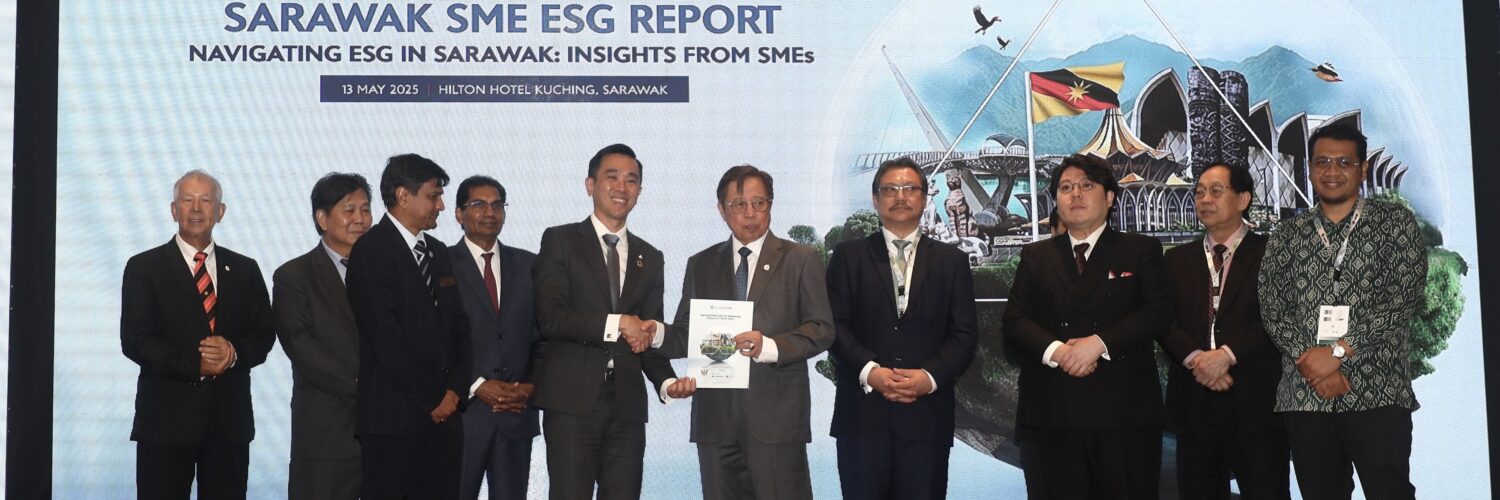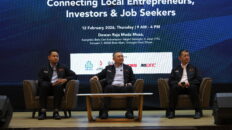Kuching, 13 May 2025 – In a step forward for sustainable business development in East Malaysia, Alliance Bank Malaysia Berhad (“Alliance Bank” or “the Bank”) has launched its inaugural Sarawak SME ESG Report — a pioneering study that explores Environmental, Social and Governance (ESG) adoption among small and medium-sized enterprises (SMEs) in Sarawak.
The report, Navigating ESG in Sarawak: Insights From SMEs, was unveiled by the Premier of Sarawak, The Right Honourable Datuk Patinggi Tan Sri (Dr) Abang Haji Abdul Rahman Zohari bin Tun Datuk Abang Haji Openg, during the Hydrogen Economy Forum (H2EF) in Kuching. The event was also attended by Deputy Minister for Energy and Environmental Sustainability (MEESty), Datuk Dr. Hazland Abang Hipni, and Deputy Minister of International Trade, Industry and Investment (MINTRED) Sarawak, Malcolm Mussen Lamoh.
A collaborative effort between Alliance Bank, the Sarawak Government, InvestSarawak, Monash University Malaysia, and the United Nations Global Compact Network Malaysia & Brunei (UNGCMYB), the report provides critical insight into how Sarawak’s SMEs are approaching ESG, highlighting both progress and pain points.
Progress with Purpose
The study reveals promising momentum:
- 62% of SMEs in Sarawak are aware of ESG practices, thanks to ongoing efforts by government agencies, NGOs, and the private sector to raise awareness.
- 66% have already integrated ESG practices into their operations — including some who may not even realise they are doing so (unconscious adopters).
- Among non-adopters, a striking 98% expressed strong intent to adopt ESG, with 59% planning to act within the next two years.
The main drivers behind this shift? Market expectations, evolving consumer demands, and the search for cost efficiencies — all of which have made ESG adoption a strategic move for competitiveness and growth.
A Timely Intervention
“The launch of this report is not only timely but essential,” said Kellee Kam, Group Chief Executive Officer of Alliance Bank. “It offers a state-specific lens into the ESG journey of SMEs, equipping them with insights to make better decisions and benchmarks to inspire best practices across industries.”
He acknowledged the key hurdles that SMEs face:
“Many businesses are limited by resources, staffing and confusion over multiple ESG frameworks. Financing is also a major barrier. These are real issues, and we must work together to address them. This report is a step in that direction — to guide SMEs with clarity, tools and practical recommendations.”
Driving Collective Impact
In the report’s foreword, Premier Abang Johari reiterated Sarawak’s dedication to embedding sustainability into the core of its economic strategy, as outlined in the Post COVID-19 Development Strategy 2030 (PCDS 2030). He highlighted the report’s role in identifying where support and intervention are needed to help SMEs stay resilient and competitive.
Echoing this sentiment, Deputy Premier Datuk Amar Awang Tengah pointed to growing awareness among local companies and their appetite for ESG-aligned strategies. “Our companies are actively seeking pathways to implement ESG. It is critical to ensuring Sarawak’s long-term economic resilience.”
Timothy Ong, CEO of InvestSarawak, one of the report’s key partners, emphasised the importance of enabling action:
“ESG practices are becoming vital for businesses to remain competitive, attract investment and ensure long-term viability. The findings clearly show that Sarawak’s SMEs recognise this, and many are already taking steps in the right direction.”
InvestSarawak has committed to supporting SMEs through greater clarity, financial aid and capacity-building programmes.
Evidence-Based Policy and Support
Speaking on the research component, Professor Dato’ Adeeba Kamarulzaman, CEO and Pro Vice-Chancellor and President of Monash University Malaysia, noted the importance of academic insight in shaping effective policies.
“This initiative exemplifies the power of collaboration between government, academia, industry and civil society. The state-wide study delivers actionable data that informs ESG strategies while strengthening SME resilience and inclusive growth in Sarawak.”
Looking Ahead
While ESG awareness and adoption are growing among Sarawak’s SMEs, the road ahead requires concerted effort. Key barriers include limited resources, a lack of skilled personnel, fragmented information, and inconsistent ESG frameworks.
The Sarawak SME ESG Report sets the foundation for more focused interventions — offering data-driven insights, sector-specific recommendations and pathways to help local businesses thrive sustainably. As Sarawak positions itself as a forward-looking economy, empowering SMEs to embrace ESG will be vital in shaping a future that is not only competitive but also inclusive and climate-resilient.









